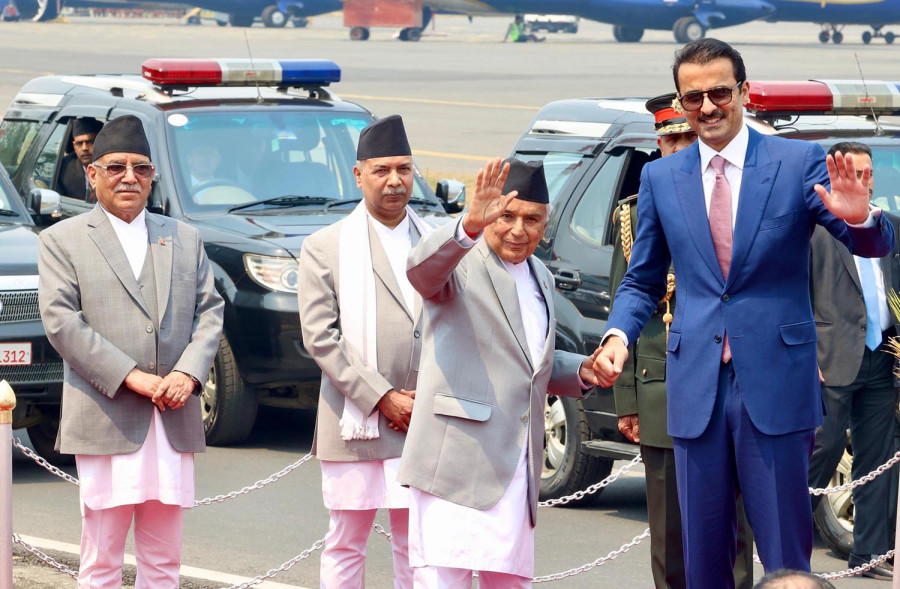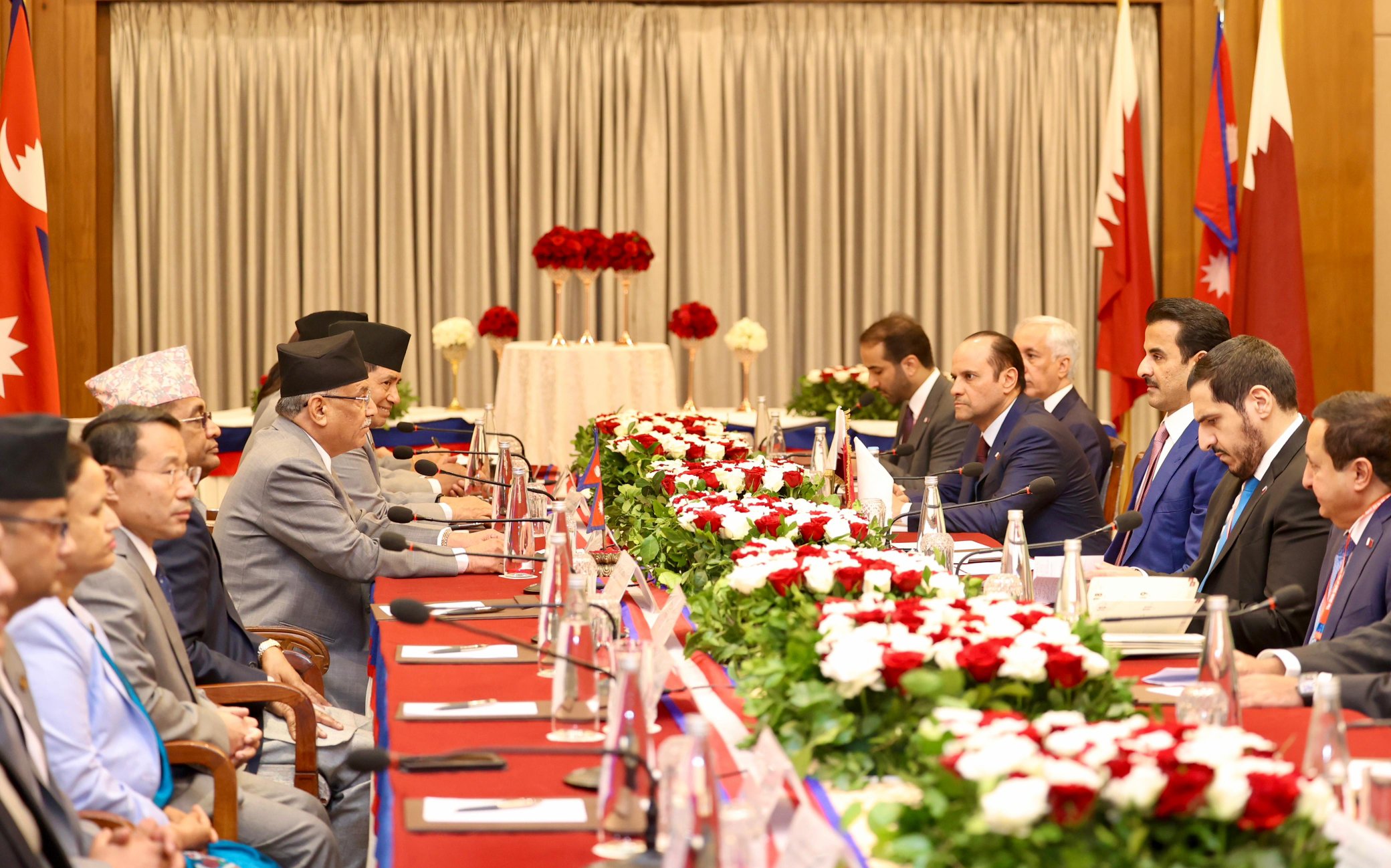National
Deals signed with Qatar, but no major breakthrough
Nepal proposes a dozen projects seeking Qatari investment. Officials cite time constraints and insufficient homework.
Anil Giri
This week, Nepal accorded the highest respect to a foreign leader when it hosted the emir of Qatar, Sheikh Tamim bin Hamad Al Thani, five years after it bestowed similar honour on Chinese President Xi Jinping when he came in October 2019.
The country even declared a public holiday on Tuesday in honour of the emir, and organised a special ceremony at the Tribhuvan International Airport upon his arrival from Dhaka, Bangladesh. President Ramchandra Paudel himself received the emir at the airport.
Given the emir’s status as one of the richest heads of state and Qatar’s position as among the top ten richest countries, Kathmandu had high expectations from the visit.
Also, during his Bangladesh visit, the emir signed some significant accords and pacts and the Bangladeshi government named a prominent avenue from ECB circle to Kalshi Point in Dhaka, as well as a park, after the emir.
In his efforts to achieve some breakthroughs, Prime Minister Pushpa Kamal Dahal held two meetings with the Qatari emir on Tuesday and Wednesday, government officials privy to the development told the Post.
On Tuesday, Prime Minister Dahal held a one-on-one with the emir and discussed some projects related to infrastructure and healthcare, among others. And on Wednesday, the prime minister held delegation-level talks with the Qatari emir at Hotel Soaltee, after which eight agreements were signed between the two countries.
Besides these, Nepal was also looking to finalise a renewed labour pact with Qatar so as to improve the working conditions of Nepali migrant workers in the Gulf country.
Approximately 400,000 Nepali nationals are currently living and working in Qatar and there is also a growing call for providing round-the-clock insurance to Nepali migrant workers.
Considering Qatar’s economic stature, some officials, experts and leaders of the Nepali community living in Qatar had advised the government to seek Qatari financial assistance for some mega projects related to airports, hydropower and roads.
During their meeting on Wednesday, Prime Minister Dahal and the emir took stock of the existing bilateral relations and ‘furthering avenues of partnership’, according to a statement issued by the Ministry of Foreign Affairs.
The documents signed on Wednesday include an MoU on cooperation in the fields of Culture and Arts between the Ministry of Culture, Tourism and Civil Aviation of Nepal and the Ministry of Culture of the State of Qatar; agreement on Cooperation and Exchange of News between National News Agency, Nepal (RSS) and Qatar News Agency (QNA); MoU for cooperation in the field of Education, Higher Education and Scientific Research between the Government of Nepal and the Government of the State of Qatar; and MoU on cooperation in the field of Youth and Sports.
Likewise, an MoU for cooperation between the Office of the Attorney General of Nepal and the Public Prosecution of the State of Qatar, and another on cooperation in the field of Diplomatic Training and Education between The Institute of Foreign Affairs (IFA) of the government of Nepal and the Diplomatic Institute of the Ministry of Foreign Affairs of the State of Qatar were also signed on the occasion.
Moreover, two private sector agreements/MoUs were signed between the Federation of Nepalese Chambers of Commerce and Industry (FNCCI) and Qatar Chamber on Wednesday, according to a statement issued by the Ministry of Foreign Affairs.
According to the Qatari News Agency (QNA), the emir “affirmed the significance of the visit in light of the distinguished relations between the two countries, looking forward for the outcome of the visit to contribute to consolidating the bilateral cooperation in various fields, for the benefit of the two friendly countries and peoples.”
“The Amir praised the Nepalese community in the State of Qatar and its contribution to various development areas in the State. During the session [meeting with the prime minister], the two sides discussed aspects of cooperation between the two friendly countries and ways of promoting and developing them, in addition to the most prominent regional and international issues of common concern,” writes the QNA, a state-owned agency of Qatar.
Despite earlier plans, some agreements, however, could not be signed.
The two sides were to sign an MoU for mutual cooperation in the fields of health, an MoU for mutual cooperation in the fields of sport and youth, and yet another MoU in the field of labour. But only the MoU on sport and youth was signed on Wednesday. Another planned MoU on customs cooperation and exchange information for ideal reinforcement of customs law was also dropped, according to foreign ministry officials.
There was also a proposal to amend certain clauses of the air service agreement signed between Nepal and Qatar on July 8, 2002, but the proposal was also put on hold.
Likewise, a proposed MoU in the fields of tourism and business events, and another MoU between Qatar Fund for Development and Nepal’s Ministry of Education were also dropped during negotiations.
Similarly, a planned signing of an agreement on mutual legal and judicial assistance in criminal matters between the Office of the Attorney General of Nepal and the Public Prosecution of the State of Qatar was also dropped at the last moment, said an official at the Ministry of Foreign Affairs privy to the negotiations.
There was also a draft agreement on the transfer of convicts between the Public Prosecution, the State of Qatar and the Office of the Attorney General of Nepal and a proposal related to the extradition of accused persons between the Public Prosecution, the State of Qatar and the Office of the Attorney General of Nepal, but these have also been put on hold.
Officials said many of these agreements could not be finalised due to time constraints and lack of homework. “These proposals will be further negotiated and signed in due course. Some of these agreements were proposed by Nepal and some by Qatar,” an official at the Ministry of Foreign Affairs said.
Meanwhile, Deputy Prime Minister and Minister for Foreign Affairs Narayan Kaji Shrestha claimed that the emir’s visit was highly successful and would soon yield tangible results.
“We have discussed some projects and offered them investment opportunities in Nepal,” Shrestha told the Post.
The two sides also agreed to constitute a bilateral task force in order to identify the areas of cooperation and investments. The Qatari side communicated that they will do homework on Nepal’s proposal and investment offer and get back soon.
During the bilateral talks, the Qatari side expressed its desire to import drinking water from Nepal and to invest in Nepal’s agriculture, renewable energy and tourism sectors, according to Deputy PM Shrestha.

The two sides will form a joint mechanism to identify projects and areas of cooperation, according to Shrestha.
“We also asked them to invest in hydropower projects in Nepal as we have some ready-to-go projects,” said Shrestha.
Nepal also requested the Qatar government to help build a new cricket stadium and provide assistance to expand the Kanti Child Hospital and another children’s hospital being built by renowned cardiologist Dr Bhagwan Koirala, according to Shrestha.
“We discussed a lot of issues in detail and took up many areas of cooperation where Qatar can invest. The emir told us that they will do necessary homework and get back to us. So you cannot say we could not make substantive progress,” said Shrestha.
Meanwhile, former foreign minister Ramesh Nath Pandey said the emir’s visit is part of ‘Qatar National Vision 2030’ and it will help bolster bilateral relations.
A Nepali diplomat based in the Gulf region said the current Qatari emir is ambitious and influential and his influence in global politics has risen significantly in light of the ongoing Israel-Hamas conflict.
It is believed that Qatar maintains good relations with the Palestine state.
“They want to build economic and strategic partnership with the countries that do not have strategic partnership with major powers. Countries like Nepal and Bangladesh fall in this category. Qatar seeks to engage with countries like Nepal to fulfil its ambitions,” he said.
Some important issues were discussed in scheduled and unscheduled meetings between prime minister and Qatari emir both on Tuesday evening and on Wednesday morning, said Pandey. “But due to lack of adequate homework for the visit, we could not derive maximum advantage.”




 16.12°C Kathmandu
16.12°C Kathmandu















